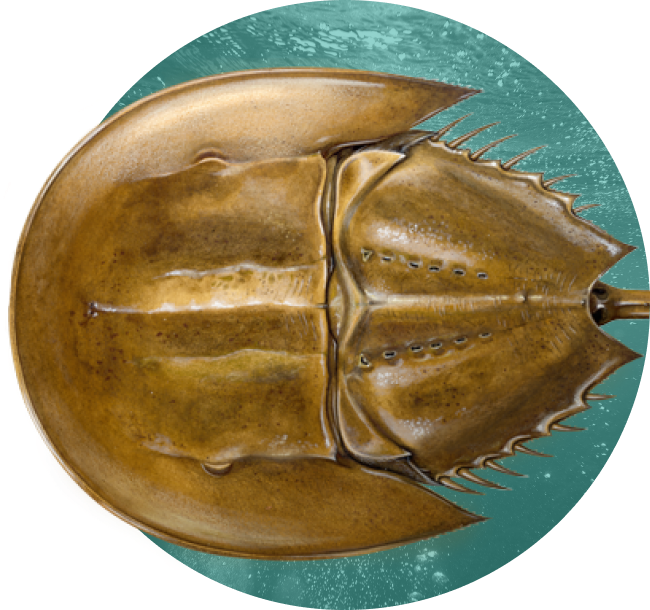- Explore:
In May 2025, the Horseshoe Crab Management Board approved Addendum IX. The Addendum allows the Board to set specifications for male-only harvest for up to three years at a time. It also establishes a method for managing male-only harvest limits during multi-year specifications periods, reestablishes seasonal harvest restrictions, and clarifies policy related to harvest caps for Maryland and Virginia.
The Addendum, which was initiated in October 2024, responds to recommendations from the Horseshoe Crab Management Objectives Workshop held in July 2024. The Workshop convened a small group of stakeholders to explore management objectives for the Delaware Bay-origin horseshoe crab fishery. The workshop participants recommended the Board establish an interim solution to maintain male-only harvest while changes to the Adaptive Resource Management (ARM) Framework are explored to better align the model with stakeholder values.
The ARM Framework was adopted in 2012 to manage the Delaware Bay region horseshoe crab bait fishery with consideration of horseshoe crab’s important role in the ecosystem as a food source for migratory shorebirds. Established through Addendum VII, the ARM Framework incorporates both shorebird and horseshoe crab abundance levels to set optimized harvest levels for horseshoe crabs of Delaware Bay origin. Since 2013, the Board has annually reviewed recommended harvest levels from the ARM model, and specified harvest levels for the following year in the four Delaware Bay states. In 2021, a revision to the ARM Framework was completed to update and improve the ARM model with an additional decade of data on shorebirds and horseshoe crabs in the Delaware Bay region and advancements in modeling software and techniques. The Board adopted the revised ARM Framework for setting harvest specifications for the Delaware Bay region under Addendum VIII in November 2022.
Under the Addendum, the Board can set multi-year specifications for up to three years until 2031 based on the ARM Framework. In interim years when the ARM is not used, the Board will manage maximum male harvest limits based on Delaware Bay region spawning survey data. Addendum IX also reestablishes a harvest closure for the Delaware Bay region states from January 1 through June 7. Lastly, the Addendum clarifies the policy included in Addenda VII and VIII for applying Maryland and Virginia harvest caps; these caps further restrict harvest for Maryland and Virginia when female harvest is implemented in the Delaware Bay region.
Phase
Status
October 2024: Board initiated Draft Addendum IX
Completed
Winter 2025: Plan Development Team develops Draft Addendum document for Board consideration for public comment
Completed
February 2025: Board approves Draft Addendum IX for Public Comment
Completed
March 2025: Draft Addendum IX Public Comment Period, including Public Hearings
Completed
Spring Meeting 2025: Board approves Addendum IX
Completed
State Implementation of Addendum IX
January 1, 2026
Public Hearings
The Atlantic States Marine Fisheries Commission conducted the following public hearings to gather input on the draft addendum:
-
NJ Horseshoe Crab Draft Addendum IX Hearing
Tuesday, Mar. 18, 2025
-
VA Horseshoe Crab Draft Addendum IX Hearing
Thursday, Mar. 20, 2025
-
MD Horseshoe Crab Draft Addendum IX In-Person Hearing
Wednesday, Mar. 26, 2025
-
DE Horseshoe Crab Draft Addendum IX Hearing
Thursday, Mar. 27, 2025
Public Comment
Public comment on Addendum IX was accepted until 11:59 PM (EST) on March 31, 2025. This included comments received at a public hearing or written comments submitted to the Commission. All comments were reviewed by Commission staff and compiled into a Public Comment Summary, which was provided to the Horseshoe Crab Management Board as part of the meeting materials for the 2025 Spring Meeting.
Contacts
- Caitlin Starks, Senior Fishery Management Plan Coordinator, cstarks@asmfc.org or 703.842.0740
Action Development Timeline & Documents
2021
ARM Framework revised to update and improve the ARM model with an additional decade of data on shorebirds and horseshoe crabs in the Delaware Bay region and advancements in modeling software and techniques. External peer review endorses ARM revision.
November 2022
The Board adopts revised ARM Framework for setting harvest specifications for the Delaware Bay region under Addendum VIII in November 2022. ARM Framework output allows for limited female harvest for first time. Board approves male-only harvest based on overwhelming public support for the prohibition of female harvest.
Fall 2023
Board conducts stakeholder survey to better understand their diverse perspectives and values, and whether changes to horseshoe crab management for the Delaware Bay region should be considered.
July 2024
Commission holds Horseshoe Crab Management Objectives Workshop to increase understanding of various stakeholder perspectives and interests, and identify concerns, alternatives, and areas of common ground for HSC management to inform possible changes to the management program for the Delaware Bay region.
October 2024
Board initiates development of Draft Addendum IX in response to recommendations of the Horseshoe Crab management Objectives Workshop. Draft Addendum will consider adding an additional specifications tool that would allow for male-only harvest limits to be set for multiple years for the Delaware Bay area states.
December 2024
Plan Development Team meeting to begin development of Draft Addendum IX.
February/March 2025
The document is released for public comment through public hearings and written comment.
Next Steps
The states will implement the season closure provisions of Addendum IX by January 1, 2026.
